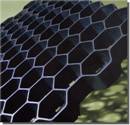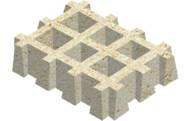Types of Permeable Pavers
When it rains, water hits a road or a pavement that is not permeable and will automatically flow downwards to a low point, normally a drain of some type. Then this water is transported through pipes and flows into rivers, streams and channels. After heavy storms and rainfall, the water will flow through the channels at amazing speeds and will in turn take with them a lot of sediment, pollutants, chemicals and oils into our catchment areas. |
 |
High speeds of water flow will also increase the risk of flooding, erosion and perhaps even damages to the natural environment. The consequences are serious for both human beings and our natural flora and fauna. Storm water runoff can cause grave environmental problems.
 |
If more and more homeowners, contractors, builders, designers and architects were to use Permeable Pavers for their driveways, street pavements, public grounds, parks and parking lots, then we could help protect our precious natural resources, such as water, the natural environment and all the flora and fauna that go into it. |
DIFFERENT TYPES OF PERMEABLE PAVING SURFACES
When choosing the types of permeable paver that's best for your particular application, there are a few things to consider, like what the area will be used for and how you want the overall appearance to look.
Mulches
| Mulches are good for areas that will not be used very much at all. They are a good pervious material and are cost effective and readily available, they are also extremely easy to install and do not require the help of a professional. You can purchase mulches such as; pebbles, barks, gravel or sod, it's up to you. |  |
They are also available in a wide range of colors, so there is something for all individual tastes. Mulches do however require regular maintenance and you will also have to top up their levels quite often.
Grass Pavers
 |
Grass Pavers are becoming very popular, for they have great permeable qualities. They are made with voids on the pavers, which is where once installed, grass or vegetation is planted inside and allowed to grow through it. The pavers themselves can be made from plastic, concrete or gravel, and can be used in high traffic areas. They allow grass to grow where it would normally not be a possibility. |
Interlocking Concrete PaversThere are a range of Interlocking Concrete Pavers that are also Permeable Pavers. These are made to resemble a type of grid, where each paver interlocks into each other but has a void or a hole in the surface. This is where it is possible to plant vegetation or fill it with other pervious materials like gravel or mulches. These voids allow for the filtration of rainwater back into the sub-soils, rather than in our waterways. |
 |





